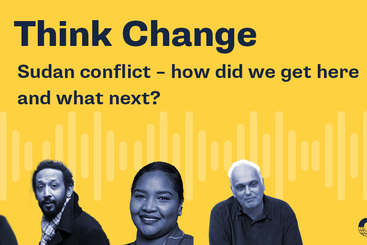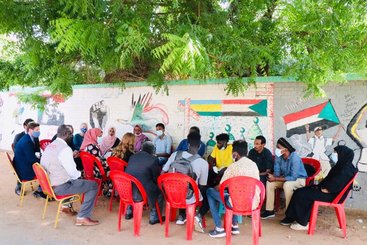In the past 10 months since war erupted across Sudan, thousands have been killed and millions displaced. Now experts suggest that the country is experiencing the worst hunger levels ever recorded.
The scale of the catastrophe must be contained, however the window to reduce the severity of this crisis is rapidly closing. A matter of weeks remain to act to reduce the scale and intensity of immense suffering. A lack of timely and adequate action will contribute to what is becoming the world’s largest hunger crisis in decades and will exacerbate what is already the largest displacement crisis in the world.
In early March, the Humanitarian Policy Group (HPG), the Clingendael Institute, Tufts University and the Conflict Sensitivity Facility hosted an urgent discussion on Sudan's growing hunger crisis to explore the scale of the situation and the urgent next steps required. Overwhelmingly, speakers gave a sense that business as usual is not an option, noting that we need not just a humanitarian solution, but an effective political one too.
It was clear from our panellists' reflections that the time has come to declare the situation in Sudan a famine risk, so that well-informed and concerted efforts can be taken to address it without delay. Sudan is at a critical juncture, and international, national and local engagement is vital to manage the severity of this crisis.
The scale of the problem
Speaking to her most recent research, Anette Hoffmann of the Clingendael Institute highlighted that Sudan is experiencing the highest post-harvest food shortages ever, at around 37% of its usual level, and only 10% of the population have been reached with food aid. Clingendael research has concluded that the most likely scenario will see catastrophic levels of hunger by June 2024, with ‘famine-like conditions’ experienced in parts of the country. Most importantly, Hoffman stressed that without meaningful interventions, next year would be even more dire.
Dr Alex de Waal, Executive Director of Tufts University’s World Peace Foundation, explained how the nature of the recurrent acute crises that have impacted Sudan have led to not only a ‘loss of life and homes, but also of dreams and futures’. He reflected on the terrible failure of the international community to supply economic assistance to allow Sudan to get out of its economic and food crisis, noting the alarming effects of the recent humanitarian funding squeeze.
Youssif El Tayeb, a Sudanese humanitarian living in an affected region and the Executive Director of the Darfur Development and Reconstruction Agency, spoke to the reality of life in Sudan currently. He said: ‘What I’m seeing is that what we’ve built over the last 40 years is completely destroyed, rendered ineffective to deal with current conflict.' He continued that while the distribution of lifesaving assistance is, indeed, necessary, it is the physical protection of people that matters most. He urged the international community to ‘listen to the sounding bell of catastrophe’ in Sudan.
The resilience of local responders: a blueprint for action
Hassan Alattar Satti, Researcher and Visiting Fellow at Tufts University’s Feinstein International Center, was keen to highlight the efforts of locally led responses in Sudan. He paid tribute to food and shelter initiatives and women’s associations that had been mobilising resources in creative and unique ways, during a time when government services are ‘barely functioning’ and risks such as looting and simply being overwhelmed by demand loom heavy. Satti pointed out that INGOs had been playing a positive role in giving funds and expertise to some locally led organisations, and that it is vital that these grassroots responses are significantly supported.
Hoffman added to this, saying that ‘it's the people who are suffering the most who have come up with the solutions’. She urged for a diversification of the range of actors who are included in response efforts, and to cut out intermediaries to reduce risk.
Satti emphasised again the importance of localisation, when discussing local researchers and NGOs, saying it is important to ‘monitor the situation closely, not remotely', and to build local research and evidence capacity, rather than making assumptions from afar. He said if we are genuinely concerned about finding solutions, a real understanding of the political context of the conflict is necessary.
What now?
Our speakers highlighted several interventions that should be prioritised, specifically the need for solutions which build on successful local and community-led responses, and those which are conflict sensitive and appropriate. The indications from experts across the sector, including those working on the ground in Sudan, is that existing approaches are unsuitable in this current context, and that a more urgent, coherent and inclusive plan is needed.
Some of the key recommendations from the event and supporting research include:
- Solutions should start from what works – look for and invest in creative solutions that are centred on building Sudanese communities’ agency. Work closely with Sudanese responders to further enable their response, including calling for the immediate restoration of vital telecoms and Internet services, supporting direct mobile transfers to people in need and first responders.
- Urgently increase funding – especially via appropriate funding mechanisms that can enable more immediate response with a wider range of actors, as applied in previous crises of this severity and scale. In particular, enabling funding and support to reach local responders (who may not be registered) in ways which also recognise the specific demands and challenges they are facing.
- Contextualise approaches – recognise the urgency of the risk of famine and escalate diplomatic and economic pressure as a strategy to end the war. This includes acting to ensure that aid and humanitarian access can reach all areas of the country and are not politicised in negotiations.
- Recognise opportunities and mobilise to respond – urgent action is required for immediate food aid. Famine prevention strategies and response should be multifaceted and fit for the context.
HPG is grateful for the expert insights offered by our guests on this crucial topic, and we invite you to watch this discussion in full if you missed it.
This event is part of our wider ongoing work on Sudan, led by HPG Director Sorcha O’Callaghan. Since the start of the war, HPG has convened informed conversations that have focused on how to best support mutual aid and local civil society efforts, and what more can be done to influence the international community to act with more urgency on Sudan.
If you’d like to be kept up to date with this work, please sign up for HPG's newsletter.




